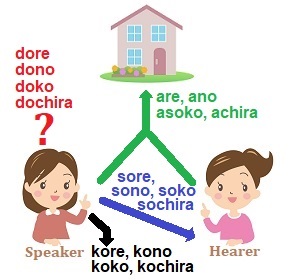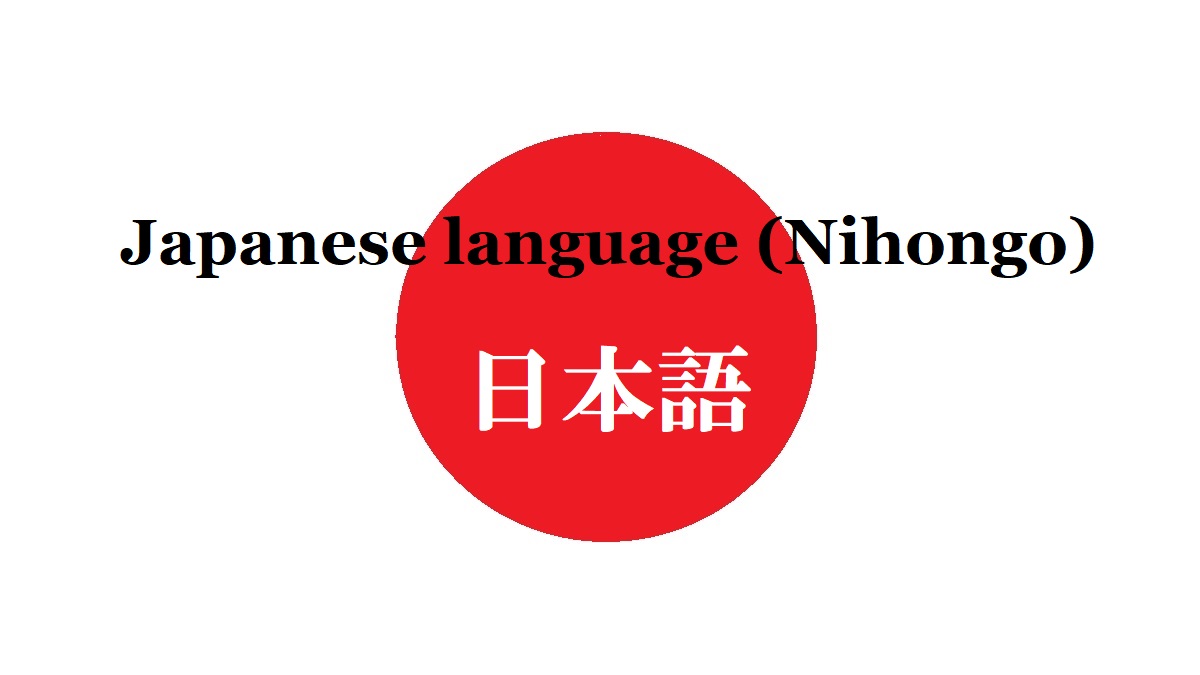[Step.6] Pronoun
In any language, the most-used words are pronoun.
Grammatically, there are some kinds of pronoun such as personal pronoun, demonstrative pronoun, etc.
Main pronouns of Japanese are similar to noun.
A particle is put after a pronoun, and a sentence element is made.
Personal pronoun
- I = watashi (私), boku (僕), ore (俺)
- we = watashitachi (私たち), bokutachi (僕たち), bokura (僕ら), oretachi (俺たち), orera (俺ら)
- you (singular) = anata (あなた), kimi (君), omae (お前)
- you (plural) = minasan (皆さん), anatatachi (あなたたち), kimitachi (君たち), omaetachi (お前たち)
- he = kare (彼)
- she = kanojo (彼女)
- they = karera (彼ら), kanojora (彼女ら)
As above, there are a few Japanese pronouns for an English pronoun.
That is a characteristic of Japanese.
First, you should use the words in bold. Because they are formal and safer words for foreign speaker.
But, the other words should be used by a certain gender and age, and if you use them incorrectly, you appear a little strange.
"Boku", "bokura" and "bokutachi" are used by only young boy.
If you are a woman, you must not use them.
If you are an old man but you think you are "young", you can use them.
"Ore", "orera" and "oretachi" are used by man.
Because it has very rough nuance, it is used only in the group of playmates.
Of course, they are never used by woman.
"Kimi" and "kimitachi" are used when the speaker regards the hearer as inferior in formal place.
For example, a boss says to the member, or a teacher says to the student.
But these are hardly used by woman.
"Omae" and "omaetachi" are also the same.
But they have a little rough nuance, so they are used in private place.
They are often used by father in the family.
"Anatatachi" is the plural form of "anata", but it has a nuance looking down on others.
Therefore, another word "minasan" is used.
For "they", "karera" is generally used.
But, if all of the group members are women, you can use "kanojora".
Making sentence element using a particle
In English, there are different words according to grammatical case.
For example, the first person has the words such as "I", "me", "my".
But in Japanese, you use only above words and have only to put a pronoun before a particle.
It is the same as a normal noun.
(Ex.1) She teaches them Japanese in Tokyo.
Two pronouns are used as subject and object.
(Ex.2) He and I go to Kyoto.
"And" is "to" in Japanese.
Demonstrative pronoun
Japanese demonstrative pronouns have four key characters.
They are "ko" (near speaker), "so" (near hearer), "a" (away from speake and hearer), and "do" (question).
- Pointing near speaker
kore (これ) = this
korera (これら) = these [plural]
kono (この) + (noun) = this + (noun)
korera no (これらの) + (noun) = these + (noun) [plural]
koko (ここ) = here (the place of the speaker)
kochira (こちら) = here (the direction of speaker) - Pointing near hearer
sore (それ) = it, that
sorera (それら) = they, those [plural]
sono (その) + (noun) = its, that + (noun)
sorera no (それらの) + (noun) = their, those + (noun) [plural]
soko (そこ) = there (the place of the hearer)
sochira (そちら) = there (the direction of hearer) - Pointing away from speaker and hearer
are (あれ) = that
arera (あれら) = those [plural]
ano (あの) + (noun) = that + (noun)
arera no (あれらの) + (noun) = those + (noun) [plural]
asoko (あそこ) = over there (the place away from speaker and hearer)
achira (あちら) = over there (the direction away from speaker and hearer) - Question of speaker
dore (どれ) = which
dono (どの) + (noun) = which + (noun)
doko (どこ) = where
dochira (どちら) = which direction

"-re" and "-rera" are put in sentence element with a particle like noun.
"-no" is put before a noun and modifies the noun.
"-ko" and "-chira" mean a place or a direction.
So, they are put in adverbial phrase with a particle.
(Ex.3) We eat sushi at that restaurant.
In Japanese, "mise" is "shop".
But "restaurant" is often translated as "mise".
(Ex.4) Here is Tokyo.
"Here" and "Tokyo" are equal.
(Ex.5) I will go there tomorrow.
In this sentence, "there" is the place of the hearer.
(Ex.6) Where will you go in Kyoto.
The question is the destination in Kyoto.
The subject of obvious pronoun is sometimes omitted
In English, the subject of sentence is never omitted.
But, in Japanese, because the sentence element is defined, the subject is sometimes omitted when the subject of pronoun is obvious.
For example, the following conversation is often done.
(English)
A: I go to Tokyo. Do you go there, too?
B: Yes, I go there!
A: When do you go?
B: I’ll go tomorrow.
A: Watashi wa Tôkyô e iki masu. Anata mo iki masu ka?
B: Hai, iki masu.
A: Itsu iki masu ka?.
B: Ashita desu.


